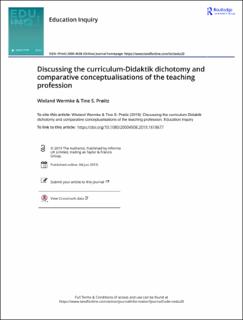Discussing the curriculum-Didaktik dichotomy and comparative conceptualisations of the teaching profession
Peer reviewed, Journal article
Published version
Permanent lenke
https://hdl.handle.net/11250/2641276Utgivelsesdato
2019Metadata
Vis full innførselSamlinger
- Institutt for pedagogikk [285]
- Publikasjoner fra CRIStin [3623]
Sammendrag
National and regional variations in school systems, have often been explained in comparative school governance research in the Nordic countries with variations in long-standing traditions in curriculum development, characterised by a dichotomy between an Anglo-American curriculum tradition and a German/European continental tradition of Didaktik. These categories have been employed to explain the characteristics of nation-specific teaching professions, such as the Swedish, Finnish, Norwegian, or German, US and English. This article suggests that the dichotomies in question complicate understandings of teachers and how they are governed in different national contexts. We investigate these relations by an analysis of quantitative data from the OECD TALIS study on how teachers receive formal feedback and appraisal in six countries, and an analysis of qualitative data in feedback technologies in Germany and Norway. Drawing on the empirical material, we suggest that the Didaktik-curriculum dichotomy might overemphasise the role of state governance in relations between different actors in school systems. Instead, the article imply that we need to discuss the role of parents and peers in educational governance more thoroughly. To further theory, it is suggested investigating teachers in the field of tension between state and civil society, and the role of teachers as civil servants and/or administrators.
Beskrivelse
Published by Informa UK Limited, trading as Taylor & Francis Group. This is an Open Access article distributed under the terms of the Creative Commons Attribution which permits unrestricted use, distribution, and reproduction in any medium, provided the original work is properly cited.

